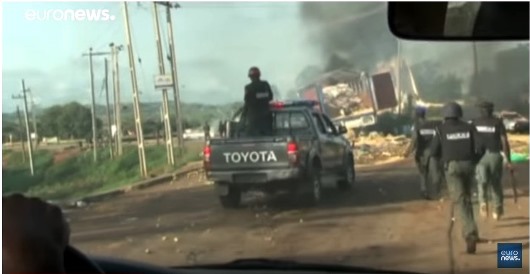From the Times of Malta and The Telegraph Photograph from Euro News
Scores of people are dead after vicious weekend clashes in central Nigeria between mostly Muslim herders and Christian farmers.
One report has claimed 86 people were killed in the conflict, which by some accounts has become deadlier than Nigeria’s Boko Haram extremist insurgency.
The deadly clashes between herders and farmers in central Nigeria are a growing security concern in Africa’s most populous country, which is roughly split between Muslims in the north and Christians in the south.
 The threat from Boko Haram, which continues to carry out attacks in the north-east, has been cited as one cause of the growing tensions as herders – also feeling the effects of climate change – are forced south into more populated farming communities in search of safe grazing.
The threat from Boko Haram, which continues to carry out attacks in the north-east, has been cited as one cause of the growing tensions as herders – also feeling the effects of climate change – are forced south into more populated farming communities in search of safe grazing.
This conflict is often pitched thus; as a clash between two types of food-rearing, exacerbated by climate change (got to get climate change in somewhere). But it’s another manifestation of a 1400 year old incursion. The spread of Islam into non Muslim territory, by force if necessary..
While few details emerged immediately of the latest killings, Nigerians on social media shared a growing sense that something awful had occurred.
Police officials said the latest round of clashes erupted on Thursday when Christian farmers from Plateau’s native Berom tribe killed five Muslim Fulani cattle herders they accused of trespassing on their land.
The Fulani, who mainly come from northern Nigeria, retaliated with a wave of attacks on six villages in the Barkin Ladi region of Plateau State. In one incident, the two young children of a clergyman were hacked to death, according to a local Christian rights group.
Officials in the state put the death toll at 120, while some activists said that 169 had died. Nigeria’s police, frequently accused of understating death tolls, said 86 people were killed.
Northern Nigeria is also awash with weapons, many of which flowed out of Libya after the collapse of authority following the death of its strongman Muammar Gaddafi — making the conflict more brutal than it once was. Worryingly, the conflict is increasingly being framed in Nigeria as a religious one, with Christians accusing the Fulani of mounting an Islamist takeover.
There is no evidence of this,(I don’t think this is a universal view – the Christians under pressure don’t see it that way) and the Fulani themselves say the violence is solely about cattle. . . President Buhari’s response to the violence has been seen as half-hearted, with previous military operations doing little to restore the peace, raising suspicion among Christians that he is turning a blind eye because he himself is Fulani.
Read the comments at the Telegraph – the readers understand the significance.
* The Christans are agriculturalists. Agriculture was the bedrock of civilisation.
The Muslims are ‘herders’. They shout at cattle and corral them onto other people’s land.
Hmm…
* The Muslims will not stop until all Christians are dead . Unless Nigeria acts now it will end up like Sudan
* Anyone only has to look at what has happened to Christians in the middle east to know that the same is happening to Africa. Lebanon was a majority Christian country only a few decades ago.
* Mulsims are never satisfied until all non Muslim religions are eradicated. They are not a religion of peace..far from it.
* This ‘conflict’ has been going on for decades if not centuries – nothing to do with climate change, everything to do with Mohammedanism.
- Like
- Digg
- Del
- Tumblr
- VKontakte
- Buffer
- Love This
- Odnoklassniki
- Meneame
- Blogger
- Amazon
- Yahoo Mail
- Gmail
- AOL
- Newsvine
- HackerNews
- Evernote
- MySpace
- Mail.ru
- Viadeo
- Line
- Comments
- Yummly
- SMS
- Viber
- Telegram
- Subscribe
- Skype
- Facebook Messenger
- Kakao
- LiveJournal
- Yammer
- Edgar
- Fintel
- Mix
- Instapaper
- Copy Link









